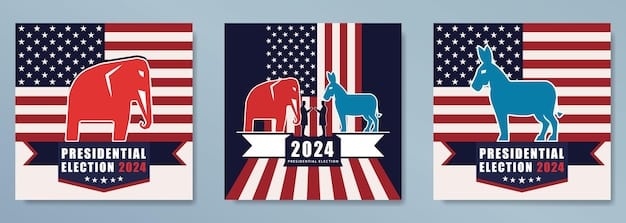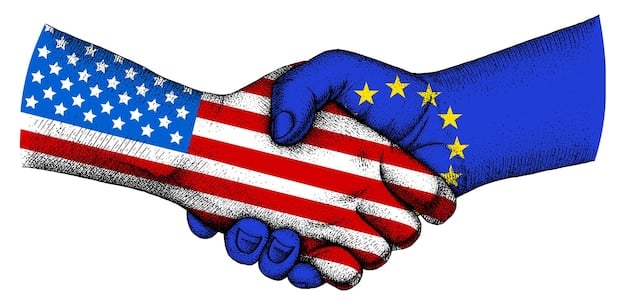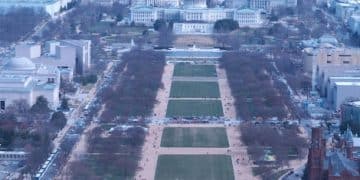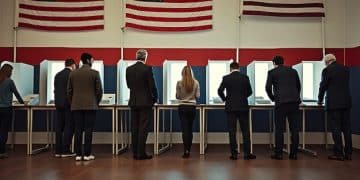How the 2025 Midterm Elections Could Change US Foreign Policy

How will the 2025 US Midterm Elections reshape foreign policy? The 2025 midterm elections could significantly alter the trajectory of US foreign policy, depending on which party gains control of Congress and how those shifts align with the President’s agenda.
The upcoming How Will the 2025 US Midterm Elections Reshape Foreign Policy? is a crucial question as shifts in Congress could drastically alter the nation’s approach to international relations.
Understanding the Stakes: Foreign Policy in Midterm Elections
Midterm elections often reflect public sentiment on the current administration’s performance. Foreign policy, while not always the primary focus, can play a significant role in shaping voter opinions and, consequently, election outcomes.
Understanding the potential impact of midterm elections on foreign policy requires examining historical trends, current geopolitical challenges, and the platforms of both major parties.
Historical Impact of Midterms on Foreign Policy
Historically, midterm elections have served as course corrections, influencing the direction of US foreign policy based on the prevailing political climate and public mood.
Current Geopolitical Landscape
The current geopolitical landscape is marked by increased competition between major powers, regional conflicts, and global challenges such as climate change and pandemics. These issues demand a sophisticated and adaptive foreign policy approach.
- Economic competition with China
- The ongoing conflict in Ukraine and its impact on European security
- Nuclear proliferation concerns, particularly in relation to Iran and North Korea
- The rise of non-state actors and transnational threats
The outcome of the 2025 midterm elections could either reinforce the current administration’s foreign policy agenda or pave the way for significant adjustments, depending on which party gains control of Congress.

Potential Shifts in Congressional Power
The balance of power in Congress is a key determinant of how effectively the executive branch can implement its foreign policy agenda. A shift in control of the House or Senate can lead to significant changes in legislative priorities, committee leadership, and the overall tone of foreign policy debates.
Understanding the potential shifts in congressional power requires analyzing key races, demographic trends, and the influence of various interest groups.
Key Senate and House Races to Watch
Several Senate and House races could prove pivotal in determining which party controls Congress. These races often feature candidates with distinct foreign policy views and offer a glimpse into the future direction of US international relations.
Demographic Trends and Voter Turnout
Demographic trends and voter turnout patterns play a crucial role in shaping election outcomes. Understanding these dynamics is essential for assessing the potential impact of the 2025 midterm elections on foreign policy.
- The growing influence of millennial and Gen Z voters
- Shifts in suburban voting patterns
- The impact of racial and ethnic diversity on electoral outcomes
- The role of voter mobilization efforts in driving turnout
The potential for shifts in congressional power is a central factor in assessing how the 2025 midterm elections could reshape US foreign policy. The election results will determine the degree to which the executive branch can pursue its international agenda or whether it will face significant legislative obstacles.
Impact on Specific Foreign Policy Issues
The 2025 midterm elections could have a profound impact on specific foreign policy issues, including trade, defense spending, international agreements, and relations with key allies and adversaries.
Analyzing the potential impact on these issues requires examining the policy positions of both parties and the legislative tools at their disposal.

Trade and Economic Policy
Trade and economic policy are often at the forefront of foreign policy debates. The outcome of the 2025 midterm elections could influence the direction of trade negotiations, tariffs, and economic sanctions.
Defense Spending and Military Strategy
Defense spending and military strategy are critical components of US foreign policy. A shift in congressional power could lead to changes in the defense budget, military deployments, and the overall approach to national security.
International Agreements and Treaties
International agreements and treaties are essential for addressing global challenges and promoting international cooperation. The 2025 midterm elections could influence the US approach to these agreements, including climate accords and arms control treaties.
The 2025 midterm elections could significantly alter the trajectory of US foreign policy on a range of specific issues. Whether the nation continues on its current course or adopts a new direction will depend largely on the outcome of these elections.
The Role of Public Opinion
Public opinion plays a vital role in shaping foreign policy decisions. Elected officials are often sensitive to public sentiment, particularly on issues that directly affect national security and economic prosperity.
Understanding the influence of public opinion requires examining polling data, media coverage, and grassroots activism.
Polling Data and Public Sentiment
Polling data provides valuable insights into public sentiment on foreign policy issues. Tracking these trends can help predict how voters might respond to different policy approaches.
Media Coverage and Framing of Issues
The media plays a critical role in shaping public perceptions of foreign policy. How issues are framed and discussed in the media can significantly influence public opinion and voter behavior.
- The impact of social media on shaping public discourse
- The role of traditional media outlets in setting the agenda
- The influence of partisan media on public perceptions
- The spread of misinformation and disinformation
Public opinion is a powerful force in shaping foreign policy decisions. The 2025 midterm elections will provide a critical test of how public sentiment influences the direction of US international relations.
Potential Scenarios and Outcomes
Several potential scenarios could emerge from the 2025 midterm elections, each with its own implications for US foreign policy. These scenarios range from continued divided government to unified control by either party.
Analyzing these potential outcomes requires considering the policy platforms of both parties and the potential for bipartisan cooperation.
Scenario 1: Continued Divided Government
A scenario in which control of Congress remains divided could lead to gridlock and limited progress on foreign policy initiatives. Bipartisan cooperation may be necessary to address pressing global challenges.
Scenario 2: Republican Control of Congress
Republican control of Congress could result in a more conservative foreign policy agenda, with a focus on national security, border control, and skepticism toward international agreements.
Scenario 3: Democratic Control of Congress
Democratic control of Congress could lead to a more progressive foreign policy agenda, with an emphasis on human rights, climate change, and multilateral cooperation.
The 2025 midterm elections present a range of potential outcomes, each with its own implications for US foreign policy. Understanding these scenarios is essential for preparing for the future of American international relations.
Expert Analysis and Predictions
Expert analysis and predictions offer valuable insights into the potential impact of the 2025 midterm elections on foreign policy. These perspectives can help inform policymakers and the public about the challenges and opportunities ahead.
Gathering expert opinions requires consulting with scholars, think tanks, and former government officials.
Insights from Foreign Policy Scholars
Foreign policy scholars provide in-depth analysis of the historical trends, geopolitical dynamics, and policy implications of the 2025 midterm elections.
Perspectives from Think Tanks
Think tanks offer policy recommendations and strategic insights based on their research and analysis. These perspectives can help shape the debate on foreign policy issues.
- The role of think tanks in shaping public discourse
- The influence of think tank research on policy decisions
- The importance of independent analysis in informing policymakers
- The potential for bias in think tank research
Expert analysis and predictions are essential for understanding the potential impact of the 2025 midterm elections on foreign policy. These insights can help guide policymakers and the public as they navigate the complex challenges of the international arena.
| Key Point | Brief Description |
|---|---|
| 🗳️ Congressional Control | Elections determine which party controls Congress, affecting foreign policy legislation. |
| 🤝 International Agreements | Midterms can influence US participation in global treaties and agreements. |
| 💰 Defense Spending | Election outcomes can shift funding priorities and military strategy. |
| 🌍 Public Opinion | Voter sentiment impacts officials’ foreign policy decisions. |
Frequently Asked Questions (FAQ)
▼
Midterm elections occur halfway through a president’s term and focus on congressional seats and local offices, whereas presidential elections determine the head of state and often see higher voter turnout.
▼
Midterms can shift the balance of power in Congress, influencing the legislative support for the president’s foreign policy agenda, including treaties, budget allocations, and international agreements.
▼
Commonly affected issues include trade agreements, defense spending, international aid, and participation in global initiatives such as climate accords and human rights efforts.
▼
Public sentiment on international issues shapes candidate platforms and voter choices, urging elected officials to align foreign policy with the prevailing public mood to maintain voter support.
▼
Yes, shifts in congressional control can alter the tone and substance of US relations with other nations, affecting diplomatic efforts, economic sanctions, and military alliances based on the new political landscape.
Conclusion
The 2025 midterm elections stand as a pivotal moment that promises to reshape the landscape of US foreign policy. By understanding the stakes, potential shifts in power, and the critical role of public opinion, we can better anticipate and prepare for the changes that lie ahead in the realm of international relations.





